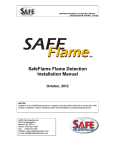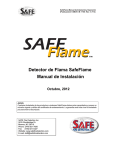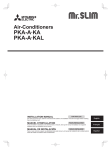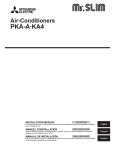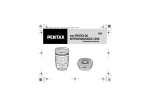Download SafeFlame SF200SX Installation manual
Transcript
SafeFlame Installation and Operation Manual (Publication#: MA-SF200OM) SAFE Flame TM SafeFlame Flame Detector Installation Manual October, 2012 NOTICE: Installers of any SafeFlame products or systems must be trained and hold a current and valid training certificate number. Warranty will be void if installed by unauthorized personnel. SAFE Fire Detection Inc. 5915 Stockbridge Dr. Monroe, NC 28110 Phone: (704) 821-7920 Fax: (704) 821-4327 Website: www.safefiredetection.com E-mail: [email protected] SafeFlame Installation and Operation Manual (Publication#: MA-SF200OM) Safe Fire Detection – Home Office Safe Fire Detection, Inc. 5915 Stockbridge Drive. Monroe, North Carolina 28110 USA Phone: 704-821-7920 Fax: 704-821-4327 E-Mail: [email protected] Web Page: http://www.safefiredetection.com NOTICE: THESE INSTRUCTIONS DO NOT PURPORT TO COVER ALL DETAILS OR VARIATIONS IN EQUIPMENT, OR TO PROVIDE FOR EVERY POSSIBLE CONTIGENCY IN CONNECTION, INSTALLATION, OPERATION OR MAINTENANCE OF SAFEFLAME FLAME DETECTION SYSTEMS. SHOULD FURTHER INFORMATION BE DESIRED OR SHOULD PARTICULAR PROBLEMS ARISE, WHICH ARE NOT COVERED SUFFICIE NTLY FOR THE PURCHASERS PURPOSE , THE MATTER SHOULD BE REFERRED TO SAFE FIRE DETECTION, INC. INSTALLATION, COMMISSIONING, SERVICE AND MAINTENANCE SHOULD ONLY BE PERFORMED BY SAFE FIRE DETECTION, INC. OR BY AN AUTHORIZED DISTRIBUTOR / REPRESENTATIVE FAMILIAR WITH ALL RELEVANT PROCEDURES AND HAZARDS. FOR INFORMATION REGARDING TRAINING SCHOOLS OR FACTORY APPROVED CERTIFICATION, PLEASE CONTACT SAFE FIRE DETECTION. Copyright Information: This Document may not be reproduced in whole or in part, by any means without the prior express written permission of Safe Fire Detection, Inc. Disclaimer: Safe Fire Detection, Inc. reserves the right to change any information contained in this manual without notice. Codes and Standards: Safe Fire Detection , Inc. strongly recommends that this manual be read in conjunction with the appropriate local codes and standards for fire detection systems and electrical connections. 2 SafeFlame Installation and Operation Manual (Publication#: MA-SF200OM) Warranty Information Safe Fire Detection’s new Flame Detector, SafeFlame is a flame detector, not a complete system, and must interface with an approved fire alarm panel that meets all local and national codes to become a system All accessories pertaining to the detector for installation and mounting must be purchased from Safe Fire Detection or the warranty may be void. If a system is desired, the fire alarm control/releasing panel can be purchased from Safe Fire Detection to create a system, and if all it's components and accessories are purchased from Safe Fire Detection Inc., Safe Fire Detection Inc. will honor it's warranty as stated below. If non -approved mounting hardw are is used and/or manufacturer’s installation instructions are not complied with fully, the detector warranty may be void. Seller warrants that detectors and/or systems purchased from Safe Fire Detection will, under normal use and service, be free from defects in material and workmanship for a period of five (5) year from the date of original sale. All parts and repairs under, the same conditions, as the systems above will be warranted for ninety (90) days. Seller agrees, upon written notice from Buyer given no later than thirty (30) days after the defect is discovered, to repair or replace at the Seller’s option any part which, after examination by Seller, is disclosed to have been defective provided that such product is retur ned to Seller transportation prepaid during the warranty period. This warranty does not apply to any damage resulting from accident, improper installation, misuse or abuse. The full extents of Seller’s warranty obligations are to repair or replace any defective part. Return Transportation is the responsibility of the buyer. There are no other warranty obligations of seller, including any warranty of merchantability or fitness for a particular purpose, either expressed or implied. Seller is not liable for any other costs, delays, labor charges, shipping or handling charges for warranty parts, or claims, nor for any consequential or incidental damages with respect to the product for its use. 3 SafeFlame Installation and Operation Manual (Publication#: MA-SF200OM) Table of Contents 1. Safe Fire Detection Company Introduction 5 2. SafeFlame IR3 Introduction 2.1 Overview 2.1.1 Model and Types 2.2 Principles of Operation 2.2.1 IR3 Flame Detection 2.2.2 RS-485 Modbus 2.3 Detector Performance Options 2.3.1 Cone of Vision 2.3.2 Detector Sensitivity 2.3.3 LED Indicators 2.3.4 False Alarm Protection and Immunity 2.4 Specifications 2.4.1 Electrical Specifications 2.4.2 Environmental Specifications 2.4.3 Mechanical Specifications 6 6 6 7 7 7 7 7 8 8 9 9 9 9 10 3. Installation 3.1 Guidelines for Installation 3.2 Unpacking the Detector and Necessary Tools 3.3 Mounting Bracket 3.3.1 Specifications 3.3.2 Installation 3.4 Wiring and Conduit Connections 3.4.1 Terminal Connections 3.4.2 Conduit 3.5 Setting up the Detector 3.5.1 Sensitivity 3.5.2 Signal Latching 3.5.3 Alarm Delay 3.5.4 Built-in-Test (BIT) 3.5.5 Relay Output 3.5.6 RS-485 11 11 11 12 12 12 12 12 16 17 17 17 18 18 18 19 4. Operating and Testing the Detector 4.1 Initial Power Up 4.2 Safety Precautions 4.3 Testing 4.3.1 Built-in-Test 4.3.2 Test Lamp 20 20 20 21 21 21 5. Maintenance and Troubleshooting 5.1 Maintenance 5.2 Troubleshooting 22 22 22 This guide is to be used as a general guideline for installing a SafeFlame flame detection system. Please be sure to check all local and state codes prior to designing and installing a system. It is advisable to contact the local AHJ in the planning stages of a project. 4 SafeFlame Installation and Operation Manual (Publication#: MA-SF200OM) 1. Safe Introduction Safe Fire Detection, Inc. is committed to providing the be st customer support in the industry. This provides our clients with the satisfaction of knowing that their valuable assets and business operation are our greatest concerns. This trust has been earned through 40 years of proven product reliability, dedica tion, and by providing unparalleled detection helping safeguard facilities around the world. Safe Fire Detection’s products have been leading the Early Warning Fire Detection (EWFD) market since 1972, protecting loss from fire, smoke, heat and water. Our new product line, Safeflame , is revolutionizing flame detection by implementing a more versatile flame detector, with greater detection distances combined with the lowest cost in the industry. We have built our reputation not just on products, but customer focused solution s. We combine extensive industry knowledge with solid technical expertise to help our clients customers safeguard their valuable assets. This manual will provide information regarding the proper installation of a SafeFlame detection system (see warrant y information), as well as a guide in planning for adequate coverage of the protected areas in accordance with accepted fire protection principles. The current NFPA 72 National Fire Alarm Code provides important information regarding the use of linear hea t detectors, including spacing and location for adequate area protection. It is important to note that codes, standards and regulatory requirements do change over time and it is highly recommended that prior to planning and installation, the Authority Hav ing Jurisdiction (AHJ) be consulted to ensure compliance. 5915 Stockbridge Dr. • Monroe, NC 28110 Tel.: 704 -821-7920 • Fax: 704-821-4327 5 SafeFlame Installation and Operation Manual (Publication#: MA-SF200OM) 2. SafeFlame IR3 Introduction 2.1 Overview SafeFlame is a IR3 type flame detector that utilizes a combination of 3 sensors. One of the sensors monitors the spectral band for CO ² emissions. The other two sensors monitor adjacent spectral bands to reduce radiation interference and reduce false alarms. The spectrum for the radiation emitted by a flame measured by the detector is altered by the distance between the detector and the fire. It can also be influenced by the concentration of CO² gas in the atmosphere. 2.1.1 Models and Types SafeFlame IR3 Aluminum SF200A SafeFlame IR3 Stainless Steel Explosion Proof SF200SX The SafeFlame IR3 Flame Detector comes in two varieties; standard and explosion proof. The standard SafeFlame detector is made from aluminum and the explosion proof SafeFlame detector is made from stainless steel. Their part numbers are notated below: SF200A - SafeFlame IR3 Standard SF200SX - SafeFlame IR3 Explosion Proof 6 SafeFlame Installation and Operation Manual (Publication#: MA-SF200OM) 2.2 Principles of Operation 2.2.1 IR3 Flame Detector SafeFlame’s triple IR (IR3) flame detector compares three specific wavelength bands within the IR spectral range of a fire and their ratio to each other. This offers fast response without the fear of typical false alarms. One sensor monitors the 4.4 micrometer range and the other sensors monitor the bands above and below. This advanced technology allows the detector to distinguish between non-flame IR sources, and flames that emit hot carbon dioxide in the combustion process (which have a spectral characteristic peak at 4.4 micrometers). As a result, both detection range and immunity to false alarms can be significantly increased. The SafeFlame IR3 detectors can detect a 0.1m² (1ft²) gasoline pan fire at up to 65m (215ft) in less than 5 seconds. SafeFlame’s IR3 detector is designed to ignore constant background IR radiation, which is present in all environments. Instead it measure the modulated part of the radiation of a fire. 2.2.2 RS-485 Modbus The SF200A/SX is capable of connecting to any RS-485 communication network by connecting to a universal controller. The detector is capable of informing the network of the current product condition (fire, fault, warning) and can be used in synch with interlinking remote control. 2.3 Detector Performance Options 2.3.1 Cone of Vision The SF200A/SX have a field of view of 90° horizontal, 90° vertical. 7 SafeFlame Installation and Operation Manual (Publication#: MA-SF200OM) 2.3.2 Detector Sensitivity The detector has two alarm levels: Warning (Pre-Alarm) and Alarm. The detection range for the detector is 200 feet (60 meters) for a standard fire. A standard fire is defined as a 1ft² (0.1m²) n-heptane pan fire. The Warning level is an alarm verification system. Having this option enabled will delay the alarm signal by approximately 5 seconds. 2.3.3 LED Indicator Three colored LED indicators are located inside the detector, one LED is adjacent to each of the IR sensors. Detector Condition LED Color and Mode Normal Warning Green LED on Red LED blinking Alarm Red LED on Reset LEDs blinking repeatedly and sequentially(counter-clockwise) Power Supply Fault Orange LED blinking (1Hz) BIT Fault Any LEDs simultaneously blinking (1Hz) Initializing Circuit Fault Any LEDs simultaneously blinking (2Hz) with 1 sec delay Orange LED Orange LED Chassis Ground Chassis Ground Green LED Green LED Red LED Red LED SafeFlame IR3 Stainless Steel Explosion Proof SF200SX SafeFlame IR3 Aluminum SF200A [Figure 1] Product Image LED Position indicator 8 SafeFlame Installation and Operation Manual (Publication#: MA-SF200OM) 2.3.4 False Alarm Protection and Immunity The detector is immune to a variety of potential false alarm sources. Below is a table showing either the immunity to a radiation source or the distance beyond which the detector is immune to the radiation source. Radiation Source Immunity Distance ft(m) Indirect or reflected sunlight Incandescent lamp 100W 10ft (3m) No False Alarm Fluorescent light 40W No False Alarm Electric Heater 1500W No False Alarm Blue, Green dome light XXXW No False Alarm Hot plate (200℃) No False Alarm Halogen lamp 500W (Glass) No False Alarm Halogen lamp 1000W (Quartz lamp) 12ft (4m) Grinding metal 3.3ft (1m) 50ft (15m) 16ft (5m) Arc welding Detection 100ft (30m) 23ft (7m) (5mm, 200A) Range 150ft (45m) 30ft (9m) 200ft (60m) 59ft (18m) 2.4 SafeFlame IR3 Specifications 2.4.1 Electrical Specifications Electrical Recommended Voltage: Rating Voltage: Max Input Voltage: Normal Average Current: Max Operating Current: 24 VDC 18 VDC to 32 VDC 36 VDC 150 mA @ 24 VDC 200 mA @ 18 to 30 VDC Relay Output Dry Contact Relays: Rating: Fire, Fault, Warning 3A at 30VDC, 5A at 125VAC, 3A at 250VAC RS-485 Communication Non-Isolation Output: Communication Speed: 2 Wiring 4800, 9600, 19200, 38400 bps (dip switch selectable) 0-20mA Current Output Non-Isolation Output: Max Resistance: Common GND(-Power) 400Ω 2.4.2 Environmental Specifications Operating Temperature: Storage Temperature: Humidity Range: -40°C to +75°C (-40°F to +167°F) -50°C to +80°C (-58°F to +176°F) 0 to 95% relative humidity 9 SafeFlame Installation and Operation Manual (Publication#: MA-SF200OM) 2.4.3 Mechanical Specifications SafeFlame IR3 Standard (SF200A) Enclosure (Material): Aluminum Weight: Detector- 1.3kg(3.3lbs.), Detector w/ Bracket- 2.5kg (5.5lbs.) Dimensions(Detector): 150 x 103 x 125mm (5.9” x 4.1” x 4.9”) Dimensions (with Bracket): 150 x 171 x 347mm (5.9” x 6.7” x 13.7”) Color: Metal Conduit Connection: 2 x 1/2” PF Wire Gauge: 14 AWG to 24 AWG Water and Dust Tight: IP67, NEMA type 4X [Figure 2] Front [Figure 3] Side SafeFlame IR3 Explosion Proof (SF200SX) Enclosure (Material): 316 Stainless Steel Weight: Detector- 3.5kg(7.7lbs.), Detector w/ Bracket- 4.5kg (9.9lbs.) Dimensions(Detector): 134 x 117 x 110mm (5.3” x 4.6” x 4.3”) Dimensions (with Bracket): 134 x 163 x 365.7mm (5.3” x 6.4” x 14.4”) Color: Metal Conduit Connection: 2 x ½” PF Wire Gauge: 12 AWG to 24 AWG Hazardous Area Approvals: Class I Div. 1 Groups B, C, and D Class II Div. 1 Groups E, F, and G Class III [Figure 4] Front [Figure 5] Side 10 SafeFlame Installation and Operation Manual (Publication#: MA-SF200OM) 3. Installation 3.1 Guidelines for Installation For optimal detector performance and protection of the hazard, please consider the guidelines for installation: Spacing: The number of flame detectors in the protected area is determined by the size of the area, the Cone of Vision, obstructions, and sensitivity. Aiming: The flame detector should be pointed toward the center of the desired area of protection. Point the detector pointed at a downward angle to prevent dust and dirt build up if possible. Sensitivity: Determined by the size of the fire at the required distance and the type of flammable materials. Wiring: Use only 12 to 24 AWG shielded wire for all power and networking cable Environment: Avoid areas that are outside of the operating range of the detector and areas that would be prone to false alarms. 3.2 Unpacking the Detector and Necessary Tools Please inspect the external condition of the detector when unpacking the product. If there is any damage on the detector please contact the manufacturer immediately. Box contents: Ÿ SafeFlame IR3 detector Ÿ Mounting Bracket Ÿ Spare bolts (detailed below) Spare Part Size Q’ty Hexagon Wrench Bolt M6x10 2 Hexagon Wrench Bolt M6x35 (OEM) 4 Holding sensors to backplate Button Screw (+) M5x30 4 For mounting the bracket Necessary Tools for Installation: Ÿ Hexagon Wrench (Metric 5M) Ÿ Phillips Screwdriver 11 Description Connecting bracket to the detector SafeFlame Installation and Operation Manual (Publication#: MA-SF200OM) 3.3 Mounting Bracket 3.3.1 Specifications Angle Adjustment: Weight: Dimensions(Bracket): Color: Enclosure Material: Wall Mounted Size: Horizontal 180°, Vertical 180° 1kg 276 x 100 x 88mm (10.9” x 3.9” x 3.4”) Metal 316 Stainless Steel 6Φ x 4 (5mm bolt) 3.3.2 Installation Necessary Tool: Components: Hexagon Wrench Driver, Screw Driver Metric M6-10 x 2pcs, Metric M5-30 x 4pcs [Figure 6] Bracket and Product 3.4 Wiring and Conduit Connections 3.4.1 Terminal Connections The detector has terminal blocks TB1 and TB2 as shown in Figure 12. Each of the terminals has a label which indicates its proper connection. Terminal 1 Terminal 2 Terminal Block TB1 TB2 Terminal VCC GND FLT_N.C. FLT_COM ALM_N.O. ALM_COM ALM_N.C. SELF TEST EXT_RST WARN_N.O. WARN_COM 485+ 4850-20mA [Figure 7] TB1 Terminal address at product cover 12 Connection 24VDC + 24VDC Fault loop normally closed Fault loop common Alarm loop normally open Alarm loop common Alarm loop normally closed Self diagnosis (BIT) input External reset input Warning loop normally open Warning loop common RS-485 communication A RS-485 communication B Current output line SafeFlame Installation and Operation Manual (Publication#: MA-SF200OM) Alarm Relay Output: Wiring Diagram Relay Status Terminal TB1 Normal (De-Energized) Alarm (Energized) ALM_N.C. Normally Closed (N.C.) Normally Open (N.O.) ALM_N.O. Normally Open (N.O.) Normally Closed (N.C.) ALM_COM Common Common Rating: 2A@28VDC, 4A@125VAC, 2A@250VAC CONTROLLER [Figure 8] Terminal wiring diagram at fire alarm relay Warning Relay Output: Wiring Diagram Relay Status Terminal WARN_N.O. Normally Open (N.O.) Warning (Energized) Normally Closed (N.C.) WARN_COM Common Common Normal (De-Energized) TB1 Rating: 2A@28VDC, 4A@125VAC, 2A@250VAC CONTROLLER [Figure 9] Terminal wiring diagram at fault and warning relay 13 SafeFlame Installation and Operation Manual (Publication#: MA-SF200OM) Fault Relay Output: Wiring Diagram Relay Status Terminal TB1 FLT_N.C. Normal (De-Energized) Normally Closed (N.C.) FLT_COM Fault (Energized) Normally Open (N.O.) Common Common Rating: 2A@28VDC, 4A@125VAC, 2A@250VAC -FLT_N.C. is default. To disable Fault relay switch SW1-8 to ON CONTROLLER [Figure 10] Terminal wiring diagram at fire alarm relay 0-20mA Current Source: Wiring Diagram Terminal Block TB2 Non-Isolation Output: Max Resistance: Terminal 0-20mA Detector Status Current Output (mA) Connection fault 0 Self diagnosis fault 2 Normal 4 Initializing Circuit fault 8 Self Diagnosis Test 12 Warning 16 Alarm 20 Common 24V-_IN(-Power) 400Ω CONTROLLER 14 SafeFlame Installation and Operation Manual (Publication#: MA-SF200OM) RS-485: Wiring Diagram RS-485 Terminals and their Connection Description TB2 Terminal Connection 485+ RS-485 A 485- RS-485 B ㆍ Communication Specification Non-Isolation Communication Full-Duplex, Half-Duplex 4800, 9600, 19200, 38400bps are available (dip-switch selectable) 1:N support (Client) Support Protocol: Manufacturer CONTROLLER [Figure 11] RS-485 Network wiring diagram Remote Reset: Wiring Diagram TB2 Terminal Connection EXT_RST Remote Reset signal line ㆍSignal Specification Operating Signal: Short Circuit (1 sec) to GND and then Open Circuit Operating Delayed Time: 1 Second Operating Continuous Time: After cancelling operating signal + initializing time CONTROLLER JP1 O O O [Figure 12] Remote reset wiring diagram 15 SafeFlame Installation and Operation Manual (Publication#: MA-SF200OM) External Self-Diagnosis Test: Wiring Diagram External Self-Diagnosis Connection TB2 Terminal Connection 485- External self diagnosis signal line Operating Signal: Operating Delayed Time: Operating Continuous Time: Same level of Signal with 24V-_IN 5 Seconds Operating delayed time + 10 sec. Result Signal Fault Normal - Fault Relay output (De-Energized) - 2mA (0.5mA): Self-test error signal Normal output for all signals - Orange LED blinking (1Hz) - Response of communication self-test fault signal CONTROLLER [Figure 13] External self-test wiring diagram Ground Connection For proper operation of the detector the SafeFlame must be grounded through a wire to the chassis. Failure to establish a ground connection can lead to greater susceptibility of the detector to power surges, electromagnetic interference, and ultimately damage to the detector. External Grounding- Connect ground wire to right side of enclosure. 3.4.2 Conduit Installation 1. Use ½” NPT-14 or M20x1.5 conduit connection or suitable explosion-proof gland to assemble the cable and conduit to the detector 2. When using conduit connection for division installation, conduit seals must be withing 18 inches (450mm) from the enclosure 3. When using conduit connection for ATEX installation, conduit seals must be placed at enclosure 4. Install the conduit including drain holes facing downward to avoid water condensation in the detector 16 SafeFlame Installation and Operation Manual (Publication#: MA-SF200OM) 3.5 Setting up the Detector The detector has 3 programmable dip-switches (SW1, SW2, and SW3) which can set and change various detector functions. Dip-Switch SW1 SW2 Description Controls and sets Sensitivity, Alarm Delay, and Output Relays Sets detector address, and Baud rate SW3 JP1 Controls other output functions Connect remote reset signal 3.5.1 Sensitivity Sensitivity setting can be adjusted by the user according to adhere to local codes, environments, or the desires of the client. Please make sure all laws, codes, and regulations are met when installing the SafeFlame detector Note: The detector must be powered off to adjust the sensitivity level and comes at the preset detection range of 200ft (60m) SW1 Switch Setting SW1-2 SW1-1 Off ON Off Sensitivity Detection Range High* Medium 200ft (60m) Off Off ON Low Very low ON ON -Reference source of detection range is 1’ x 1’ fire of n-heptane -” * “ designates the oly sensitivity approved by FM Approval. 150ft (45m) 100ft (30m) 50ft (15m) 3.5.2 Signal Latching The detector can latch the alarm signals in the case of a fire event. With this setting activated the alarm signal can only be reset two ways: one is by powering off and reapplying power manually and the other is using EXT_RST terminal short to GND. SW1 Switch Setting SW1-5 Off ON Function Automatic Recovery Alarm Latch 17 SafeFlame Installation and Operation Manual (Publication#: MA-SF200OM) 3.5.3 Alarm Delay The SafeFlame is equipped with an Alarm delay option, which provides programmable time delays by changing settings. The alarm signal will be activated if the fire still exists after the programmed delay time. But if the fire disappears within the programmed delay time, the detector will return to its standby state. The alarm delay option affects the output relays and the 0-20mA. The LEDs and the outputs indicate warning levels during the delay time only if the fire doncition exists. SW1 Switch Setting SW1-4 SW1-3 Off Off ON Off Off ON ON ON Delay Time (sec) 3 6 9 12 Note: When setting the delay time to 5, the average response time is about 12 seconds for a 1’ x 1’ n-Heptane pan flame at 197ft(60m) 3.5.4 Built-in-Test (BIT) The detector has the self diagnosis function to check whether sensors are detectable (detection of internal circuitry or sensor itself) for radiant energy as well as cleanliness of transmission windows. If there are some fault on the internal circuit or decrease of transmission intensity with obscured glass from oil vapor or dust, the detector will output the self-diagnosis fault signal. SW1 Switch Setting Function SW1-6 Off ON - The detector will self test every 12 hours Self-diagnosis function “OFF” Self-diagnosis function “ON” 3.5.5 Relay Output Warning Relay Output The detector can indicate a warning state with a warning relay output. In the warning relay enabling setting, if the detector is in the warning state, the warning relay contacts are used. This setting can be disabled to save power SW1 Switch Setting SW1-7 Off ON Function Warning relay Disabled (default) Warning relay Enabled 18 SafeFlame Installation and Operation Manual (Publication#: MA-SF200OM) Fault Relay Output This is a feature to enable the fault relay and energize (N.C.) the relay in the standby state. The setting can be disabled to save power. SW1 Switch Setting Function SW1-8 Off Fault relay Enable (default) Fault relay Disabled ON 0-20mA Current Relay Output This is a feature to enable the 0-20mA current output signal. This can be disabled to save power. SW1 Switch Setting Function SW3-1 Off Current output Disabled (default) Current output enabled ON 3.5.6 RS-485 This is a feature to enable the RS-485 communication between Maser(server) and Slave(detector) with MODBUS command. This feature can be disabled to save power. SW1 Switch Setting Function SW3-2 Off RS-485 Communication Disabled (default) RS-485 Communication Enabled ON Setting Detector Address This is a feature to set the address of detectors to identify each other when the user utilizes the RS-485 communication. Available range of addresses are from 1 to 63. If communication enabling switch (SW3-2) is OFF, address setting is not applicable. SW2 Address 1 2 . . 62 63 SW2-1 ON Off Switch Setting (SW2-1 ~ SW2-6) SW2-4 SW2-2 SW2-3 SW2-5 Off Off Off Off ON Off . . . . Off ON ON ON ON ON . . 19 Off SW2-6 Off Off Off . . . . ON ON ON ON ON ON . . SafeFlame Installation and Operation Manual (Publication#: MA-SF200OM) Setting Communication Baud Rate The detector can change the RS-485 communication baud rate. If communication is not available (SW3-2 is OFF), the baud rate setting is not applicable. After changing the baud rate, the detector must be reset before using the communication. SW2 Switch Setting SW2-7 Off SW2-8 Off ON Off Off ON ON ON Function 9600 bps (default) 4800 bps 19200 bps 38400 bps 4. Operating and Testing the Detector 4.1 Initial Power-Up Before powering-up a SafeFlame detector inspect all aspects of the installed equipment. This initial inspection can help to prevent future down time and improve the longevity and performance of the detectors. Initial Operation Before Connecting Power Common After Connecting Normal Power Fault Operational or Output Status -Fault Relay signal Open (N.O.: De-Energized) - All LEDs off -Fault Relay signal Closed (N.C.: Energized) - After 7 seconds of self-diagnosis test, LED intersect for 3 seconds (Orange → Red → Orange → etc) blinking -All output, “Normal” signal (N.C.: Energized) - Yellow LED blinking (0.5Hz) - Fault Relay signal Closed (N.C.: De-Energized) - LED “Fault” signal output - 0-20mA “Fault” signal - RS-485 communication “Fault” signal 4.2 Safety Handling Below are a few safety considerations to take into account when the SafeFlame has power connected. Ÿ Please refer to the diagrams and specifications in the user manual Ÿ Do not open the SafeFlame while the power is connected Ÿ Disassembly and assembly of the internal electrical parts is not allowed by anyone except the manufacturer. Unauthorized action will void the warranty Ÿ Before working on any equipment be sure that the detector is disconnected from any suppression or extinguishing systems. 20 SafeFlame Installation and Operation Manual (Publication#: MA-SF200OM) 4.3 Testing 4.3.1 Built-in-Test The detector will automatically perform a self-diagnostic test every 12 hours. 4.3.2 Test Lamp The TL305 generates specific IR3 radiation which can be detected by the SafeFlame detector series as a fire. It has an individual built-in internal power supply, making it portable with up to a 30 minute charge. Test Lamp for IR3 Flame Detector Model [Figure 14] TL305 Test Lamp Ÿ Testing Procedures with the TL305 1. Please wait for 10 seconds after power is connected. Check if Yellow LED is blinking 2. Turn on the TL305 and point it at the front of the SafeFlame. The recommended distance between the test lamp and the detector is within 16ft(5m) 3. If the Red LED is on, the fire is detected 4. If the product is set to reset manually, cycle power to the detector 5. If the Red LED does not turn on, please reduce the testing distance and try again. If that same problem persists, check the test lamp for functionality. If working properly, contact the manufacturer. Note: If bulb No. 1 is blinking and the radiation intensity is weak, or if the No. 2 bulb is not functioning, please re-charge the test lamp. If neither the No. 1 or No. 2 bulbs turn on, it means the test lamp is defective and require repair. Detector Status During Testing Status Before Connecting Power After Connecting Power Common Normal Fire Operational or Output Status -Fault Relay signal Open (N.O.: De-Energized) - All LEDs off -Fault Relay signal Closed (N.C.: Energized) - After 7 seconds of self-diagnosis test, LED intersect for 3 seconds (Yellow → Red → Yellow → etc) blinking -All output, “Normal” signal (N.C.: Energized) - Orange LED blinking (0.5Hz) - All output “Fire” signal 21 SafeFlame Installation and Operation Manual (Publication#: MA-SF200OM) 5. Maintenance and Troubleshooting This section deals with preventive maintenance, describes possible faults, and indicates corrective measures. Ignoring these instructions may cause problems with the detector and may invalidate the warranty. Whenever a unit requires service, please contact Safe Fire Detection or its authorized distributor for assistance. Please record the maintenance process for the detector in the maintenance book. Device name, date of installation, name or supplier, and other necessary information must be recorded accordingly. If there is any service needed, the maintenance record should be sent with the detector for reference. 5.1 Maintenance The detector must be kept as clean as possible. Clean the viewing window and the reflector of the SafeFlame periodically. The frequency of cleaning depends on the local environmental conditions and specific applications. Cleaning and operation testing must be completed at least every 6 months. Steps for cleaning the detector: 1. Disconnect power to the detector before proceeding with any maintenance including window/lens cleaning 2. Use cleaning liquid for view window on detector. Do not forget to rinse when finished. 3. Where dust, dirt, or moisture accumulate on the window, first clean it with a soft brush, and use the cleaning liquid with a soft cloth. Finally rinse it clean with water 5.2 Troubleshooting 1.Check that the detector is connected properly 2.Check that the detector is connected with the appropriate power supply polarity No LED response after power applied 3.Check the voltage supplied to the detector 4. Check to see if there has been an internal short due to a foreign substance Yellow LED blinking (2Hz) Output signals not recieved 1.Check the input voltage of the product 2.Check all wiring and search for signs of for signs of foreign substances 3. If input voltage is correct, please contact the manufacturer 1.Check that the detector is connected properly 2.Check that the wiring connections are correct according to the user manual 3. Fire signals can be measure after detection. Check if there is a signal after performing a fire test 4.Check the jumper setting for 0-20mA current output is correctly set 1. Contact the manufacturer Any LEDs blinking repeatedly (1Hz/2Hz) with 1 second delay 22 SafeFlame Installation and Operation Manual (Publication#: MA-SF200OM) 5915 Stockbridge Dr. • Monroe, NC 28110 Tel.: 704-821-7920 • Fax: 704-821-4327 23























